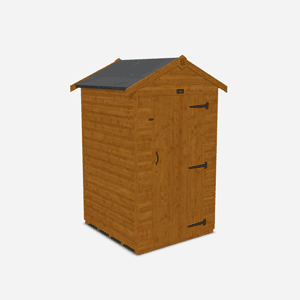How to Choose an Allotment Shed in the UK
Published: 17/09/2021

There are many factors that go into choosing the right allotment shed in the UK. And this might not be immediately apparent. After all, it’s only a plot of land and wooden building – what could go wrong? Well, before building a shed on an allotment, you need to know whether you’re allowed to put a shed on your plot. You also need to think about allotment shed size – which isn’t as simple as figuring out whether the shed fits on your piece of land; there are also legal restrictions in terms of size.
Choosing the right shed for your allotment
It's important to find the right shed for your needs. Should you choose an apex shed for its extra headroom or a pent shed for its compact size? And do you need planning permission for allotment sheds? Furthermore, an allotment shed can be made of several materials. Indeed, you have your pick of metal and plastic allotment sheds, in addition to those made from timber. So, which one should you choose? These are all questions we aim to answer (or help you answer) in this post…
What is an allotment shed?
An allotment shed is any shed that goes on an allotment. An allotment is a small plot of land you can rent to grow flowers or vegetables.
Can you put a shed on an allotment?
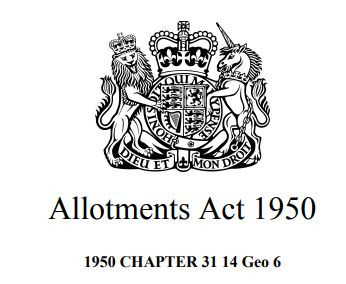
This may seem like a daft question considering this is a post about how to choose an allotment shed – but wait! There are both legal and practical factors to consider…
Allotment shed rules to look out for
Rules may differ according to where you live in the UK. And they can vary in terms of the following:
- Whether you’re allowed to build a shed
- If you need to seek permission to erect a shed
- Whether you can remove/replace existing buildings on your plot
- The size of the shed and size restrictions
- The type of shed base you use
- The position of your shed
- The number of sheds allowed (usually just one)
Before you even consider erecting a shed on your plot, you need to make sure you’re aware of how the rules in your area apply to you. To illustrate this point, rules regarding size vary quite a lot. For example, if you have an allotment in Hastings, you’re not allowed to erect a shed without the prior consent of Hastings Borough Council [1]. By contrast, Birmingham City Council allows one shed per allotment measuring no larger than 10’x8’ without the need to seek consent [2]. This highlights the issue of size (something else that can differ from one local council to another). Furthermore, some councils don’t allow the use of a concrete shed base, whereas others do. Rules may also differ if you have a plot on private land. So, before you buy a shed to put on your allotment, consult your local council and/or landlord and make sure you know the rules for your situation.
What do you want to use your allotment shed for?
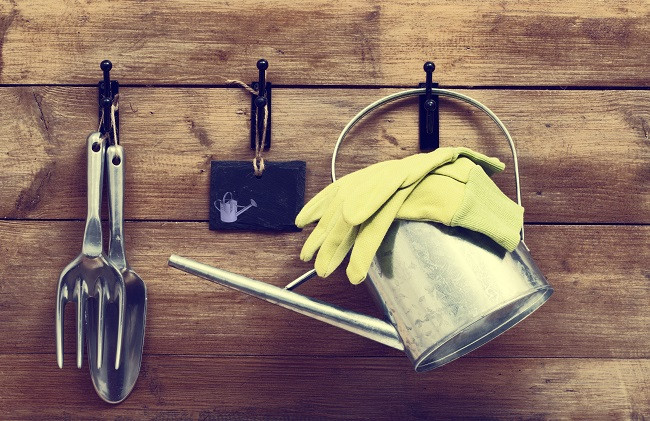
Assuming you now know the laws that govern the use of allotment sheds in your area, you know what you can and can’t do on your plot. And this means, you can now think about what you want to use your shed for. Here are some ways in which people use their sheds on allotments:
- Storage
- As a windbreak to protect seedlings
- As a place to protect and grow seeds and plants
- Harvesting rainwater
- A place to rest after a hard day’s digging
- Making a brew or cooking food
Once you know what you want to use your allotment for, you can work out what you need to keep in your allotment shed…
What should I keep in my allotment shed?
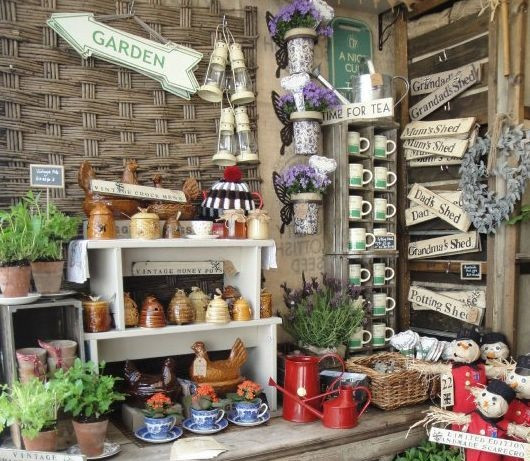
What you plan on using your allotment shed for will influence the kind of shed you need. Examples of what you may wish to store in your allotment shed include (but are not limited to) the following:
- Gardening tools
- Wheelbarrows
- Plants and seeds
- Plant pots and trays
- Potting bench
- Fertiliser
- Compost
- Shelves, drawers and racks
- Chairs or sofa
- Kettle
- Cooker
- Allotment shed woodburner
- Toilet (yes, you read that right)
Perhaps you’re wondering how it’s possible to install a cooker in your shed, or an allotment shed toilet. Well, you’ll find gas cookers that you can power using portable gas bottles, while the National Allotment Society website is a good source of information on the use of compost toilets in allotment sheds [3].
Is it legal to live on an allotment?
You are not entitled to live on a council-owned allotment and the authorities cannot give you permission to do so. However, it has been done – there’s even an article in the Guardian in which the writer talks about how his allotment shed became home [4]. But as living on an allotment is neither safe nor legal, we do not recommend it.
Allotment shed size

As we stated earlier in this article, size restrictions can vary from one area to the next, so it’s best to check with your local council before choosing a size. But as a general rule in the UK, an allotment shed should be no bigger than 8’x6’. In the next section, we provide a range of allotment shed ideas to help you choose the right one for your needs. The types of sheds that fit this size range include:
Potting shed
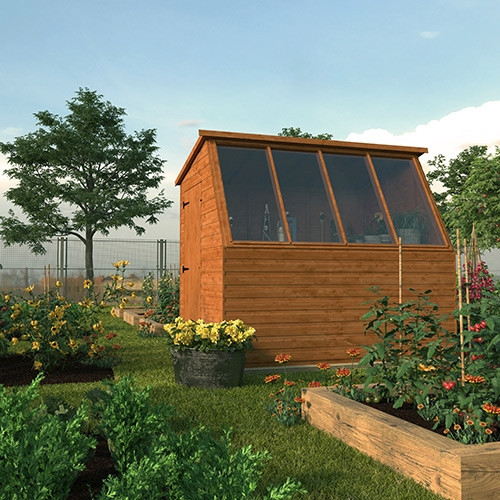
If you’re looking for a place to protect and grow plants or flowers in all weathers, a potting shed would be a wise purchase. With its large windows, it lets in a lot of sun – so if you want a place to grow exotic (or summer) plants all year round, a potting shed could be perfect. Also available in the smaller 6’x6’, as well as 8’x6’, the Tiger Potting Shed is a great option for many reasons. It includes in-built shelving, while many of our customers use theirs for storage and for spending time in. For more information on this type of building, read our post on why the potting shed is the ultimate shed and greenhouse combo.
Modular shed
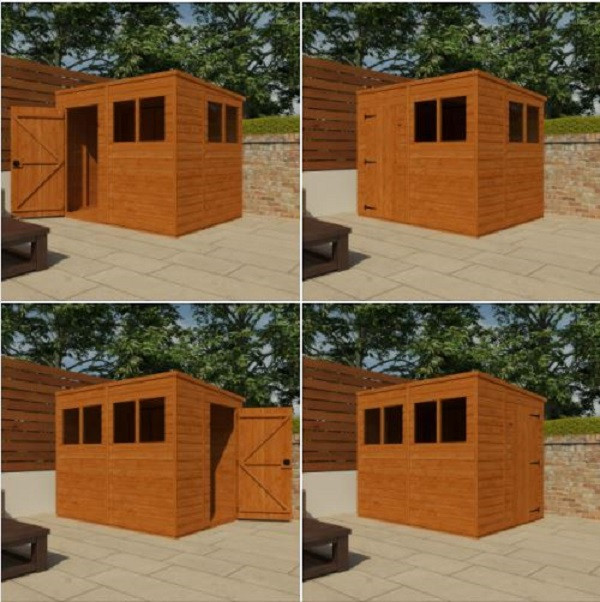
The great thing about modular sheds is that you can place the windows and doors anywhere you like. So, if you find that access to the shed is too tight on one side, you can move it to another side! The panels on modular sheds are also smaller, which means they're easy to transport - and easier to carry through your allotment! And if you need headroom, then the TigerFlex Shiplap Apex is a good option as it comes in sizes as small as 4’4’, as well as 8’x4’ – both well within the recommended range for an allotment. But if you need a small allotment shed that fits in a tight space, the TigerFlex Shiplap Pent may be a better option.
Overlap shed
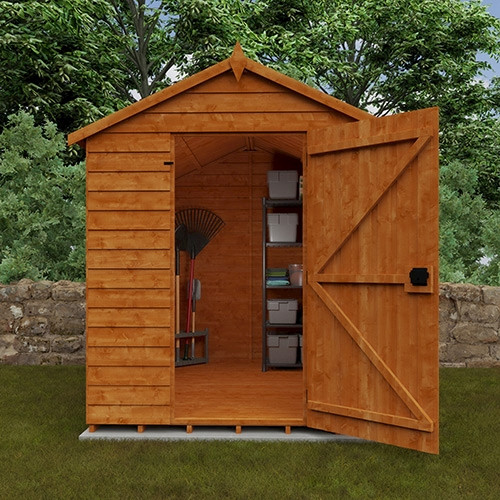
The image you – or at least most people in the UK – have of the allotment shed is likely to be an overlap shed. The traditional design may not be as weatherproof, or as secure, as a shiplap shed, but it still has its own rustic charm – and the best ones are still made from high-quality timber and represent great value for money.
Security shed

Several different security options are available when it comes to choosing your allotment shed. For example, windowless sheds can stop potential thieves from looking inside and being tempted to steal whatever goodies you keep there. To keep your possessions even more secure, the Tiger Security Apex comes with a free security bar to help prevent break-ins, and narrow ‘slit’ security windows to make it harder to see inside. Hasp and staple locks are also available as upgrades.
Tool shed
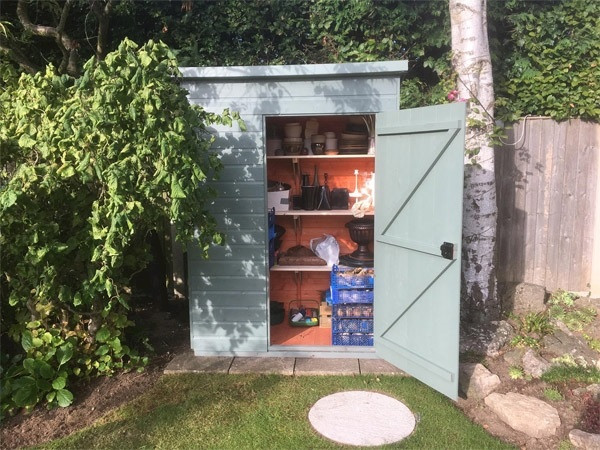
If all you need is somewhere to store tools on your allotment, there may not be any point in spending extra money on a walk-in shed. For this reason, a tool shed may be the best option. Just like the finest sheds on the market, the Tiger Premium Toolshed is made from 12mm shiplap cladding and is hand-built using the finest European softwood.
Pethouse
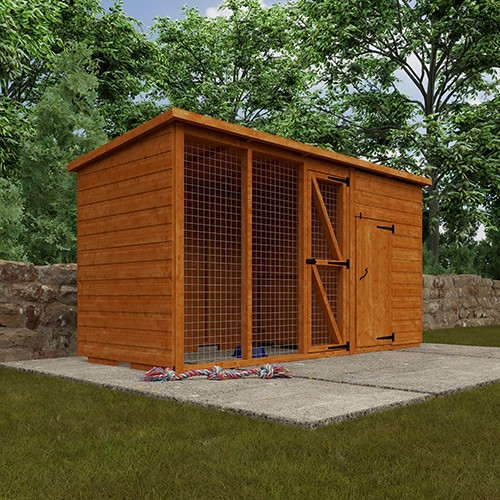
Under the 1950 Allotment Act, you are entitled to keep hens and rabbits [5], as long as you are keeping them for your own use and not for profit. With this in mind, a pethouse may be the best option for your allotment. The Tiger Pethouse and Run is designed to provide a safe, secure and warm area for your pets.
What shed material should you choose?
Another factor you must consider is what material your shed is made from. You’ll notice that all the recommendations above are wooden sheds. Well, there’s a good reason for that – we believe they’re the best option. While we do offer both metal and plastic sheds, both have their issues. While known for their security, metal allotment sheds are prone to rust – and they can get uncomfortably hot in summer. Meanwhile, plastic allotment sheds are not only susceptible to condensation build-up; they’re also hard (if not impossible) to customise. By contrast, the best wooden allotment sheds look great, are available with security features and are easy to customise to your tastes.
What do we mean by 'best' wooden sheds?
Well, cheap allotment sheds are likely to be made from flimsy OSB board and won't last very long at all. But In stark contrast, high-quality wooden sheds are made from the finest timber. At Tiger, all our sheds are made with the finest European softwood.
For your pick of the best allotment shed designs, click here.
References
[1] https://www.hastings.gov.uk/content/parks_gardens_allotments/allotments/pdfs/AllotmentRules.pdf [2] https://www.birmingham.gov.uk/info/20090/allotments/174/allotment_rules/7 [3] https://www.nsalg.org.uk/allotment-info/sheds-and-structures/ [4] https://www.theguardian.com/lifeandstyle/2007/aug/25/gardens1 [5] https://publications.parliament.uk/pa/cm199798/cmselect/cmenvtra/560/56007.htm


